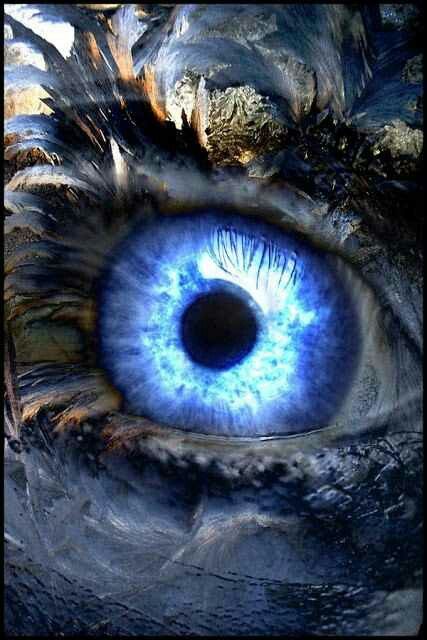Summers in California are rainless and hot, and today was no exception. But the parkland that wends along the creek and through town still affords much foliage and even green grass, and it’s 5-10 degrees cooler than in town.
The mind-as-thought completely yields to passive observation and attention as I sit beside the creek, and falls spontaneously silent, whereupon one feels strong intimations of the sacredness that permeates nature and the cosmos.
During a break, an owl soars through the wood and alights on a branch near the creek, facing downstream. I climb the low, steep bank, and the owl does not fly away. I walk slowly toward it, and it does not fly away. I stand under it, and it merely swivels its head nearly all the way around and stars down at me with big black eyes for a minute.
Standing there for over ten minutes, the owl exhibits majestic indifference, deigning only to make that preternatural turn to occasionally look at me. After descending the bank, I look back and it’s gone, without a flutter or a sound.
Human consciousness is in tremendous crisis, and many people are turning to science for insight and clarity, hoping science can show us the way out of the mess man has made of the Earth and the world.
However science cannot provide the requisite insight and radical change anymore than organized religion could. Perhaps science can disabuse us of false ideas, but irrationality and tribalistic identification are obviously much stronger than reason and scientific knowledge. Like the pandemic in America, it seems it seem we’re on our own, which doesn’t mean applying more of the disease of individualism.
David Bohm, a physicist-philosopher with whom I was fortunate enough to dialogue (and more fortunate to have favorably critiqued my philosophical insights into what used to be called “the riddle of man”), is coming into favor nearly 30 years after his death. There’s a new film out, “Infinite Potential, the Life and Ideas of David Bohm,” which has been followed during the pandemic by four discussions involving eminent physicists, Buddhist scholars, philosophers and others.
In a short teaser for the film and discussions, Jan Walleczek, a biologist and director of The Fetzer Franklin Fund, which funded the film, sums up Bohm’s “Implicate Theory” this way: “You end up with the biggest picture of a completely unified, universal perspective that also integrates the observer with the observed. And it overcomes the illusion of separation between the observer and the observed.”
That is not what Bohm meant to do, as I understood from my dialogues with him. It conflates the sub-quantum or “implicate” level of the universe with human consciousness, and tries to resolve the contradiction between the “seamless wholeness” of nature with the fragmentation of man by blurring the distinction, and glossing over the glaring difference between how humans operate and how the universe and nature unfold. I feel this is the great mistake science and philosophy have made in the last 25 years.
In the introduction, Walleczek concisely describes the biggest dilemma in science (besides the question of consciousness, which science cannot encompass):
“Quantum mechanics is really about explaining the properties of the microscopic world at the sub-atomic level. General relativity is about explaining the largest cosmic dimensions: spacetime, gravity—the whole macroscopic order of the cosmos. The two theories have not been compatible with each other since quantum mechanics was developed [in the early part of the 20th century]. There’s been a tension between the two.”
Bohm’s theory of the Implicate Order “was the first theory to have an underlying ontology, making a claim about the sub-quantum reality…this is why people are drawn increasingly to it.”

At the end of his video clip, Walleczek speaks of how “observation sounds very passive,” but it actually involves “changing the world to our needs.” By “the world” he means nature, not just the man-made world. It is a vital distinction that cannot be fudged and smudged.
In the process of changing nature to our needs, man has been fragmenting the Earth all to hell, and driving an increasing number of our fellow creatures into extinction during the hubristic “Anthropocene Age.” Man, a sentient and supposedly sapient species, is bringing about only the Sixth Mass Extinction in the entire history of life on Earth!
The observer lies at the root of man’s mistaken separativeness. The observer cannot be “integrated” however, only dissolved. That is, the illusion of the separate observer has to end for observing and direct perception to occur. The quality of undivided observation is action; there is no longer the duality between observing and acting, thinking and doing.
Bohm, one of the most pre-eminent physicists, the man Einstein called his “spiritual son,” said, “I began to feel that something beyond science would be needed” to meet the human crisis.
Ending the observer is the key, which is a tremendous art and discipline within the individual. It cannot be achieved by any scientific theory, no matter how subtle and all encompassing, only by questioning oneself and experimenting with observation within oneself.
Martin LeFevre
Link: “Infinite Potential: The Life and Ideas of David Bohm” (1:11): https://www.youtube.com/watch?v=XDpurdHKpb8
“Why Bohmian Theory Matters,” Jan Walleczek: https://www.youtube.com/watch?v=Qmd3RaxJDQM
No comments:
Post a Comment